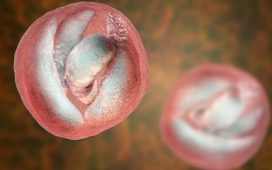An inquiry has been launched into the care of a toddler whose stage-four cancer was misdiagnosed as constipation by blundering NHS medics.
Ella Formby-Smith, three, had been ‘back and forth’ to hospital since she was born complaining of crippling stomach pain.
Doctors initially put Ella’s pain down to a viral infection, lactose intolerance or even constipation, her mother Claire claims.
But the three-year-old was eventually diagnosed with stage-four neuroblastoma — an aggressive type of cancer that mostly affects babies and young children — in March after deteriorating so badly that she was ‘crying with pain curled up in bed’.
Warrington Hospital, Cheshire, has now launched an inquiry into claims that doctors repeatedly missed crucial warning signs of Ella’s cancer.
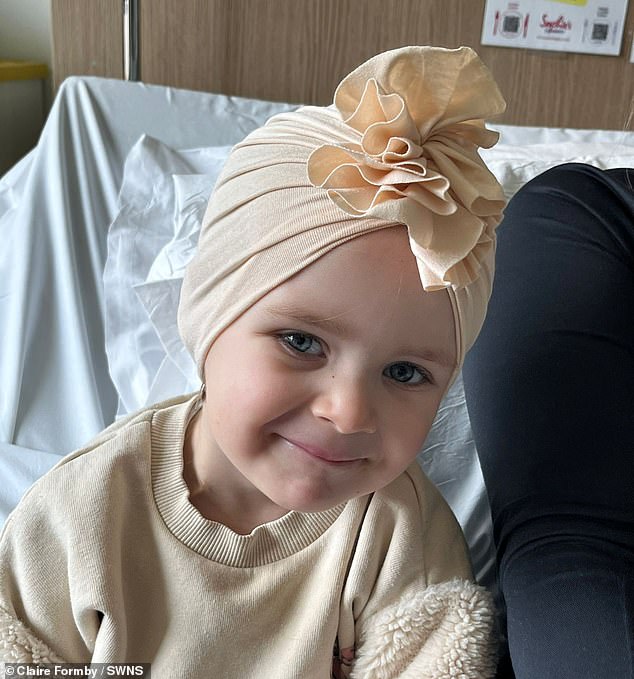
Ella, pictured, is now having chemotherapy. By stage four, the cancer has spread to parts of the body that are some distance from where it started – most commonly to the bones, bone marrow or liver.
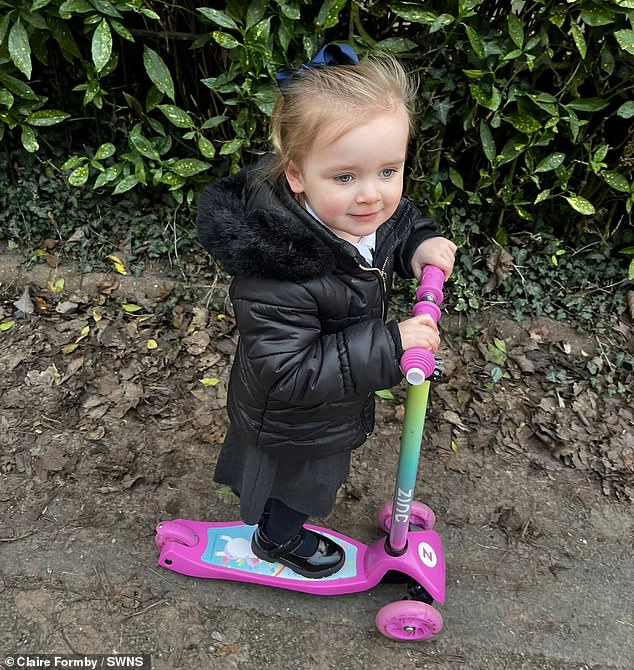
Referred to Alder Hey Children’s Hospital in Liverpool on March 16, an ultrasound scan revealed a large mass at the back of Ella’s stomach. After an MRI a week later, Ella was diagnosed on March 27
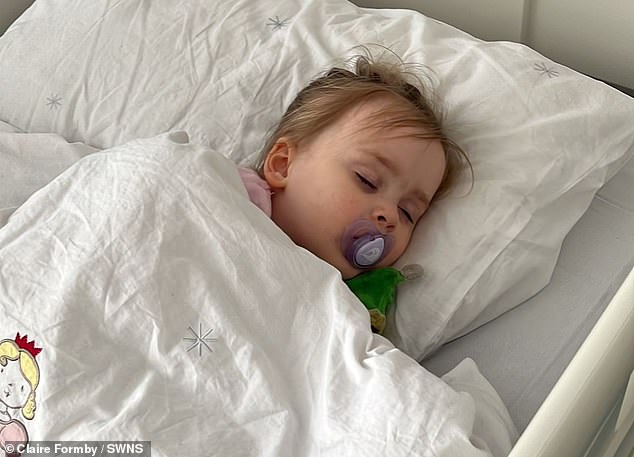
Only after Ella’s condition deteriorated in March was she further assessed and diagnosed with stage four neuroblastoma – a rare and aggressive cancer
Ms Formby, 38, from Runcorn, Cheshire, said: ‘We have been told she could have been born with this.
‘I’m just feeling so let down with the number of times we’ve been back and forth.
‘I just can’t get my head around how it’s not been detected in three years of going to hospital with stomach problems.’
Little Ella has already undergone six gruelling rounds of chemotherapy.
She now faces surgery, a stem cell transplant, radiotherapy and immunotherapy to treat the cancer, Ms Formby claimed.
‘It’s up and down at the moment. It’s good days and bad days,’ her mother said.
‘She’s got no energy and no mobility at all for her to run around or play, it’s taken it right out her.
‘She’s amazing and was active and bouncing around all the time, just a happy three-year-old who went to nursery, so it’s literally just changed her whole lifestyle.’
In previous hospital visits Ella had been diagnosed as lactose and dairy intolerant, Ms Formby claimed.
‘Every other time we’ve been we were told it’s constipation or a viral infection’, she added.
But in February the pain ‘gradually got worse’ until Ella ‘was crying with pain’.
A doctor’s appointment advised it was a viral infection, she claimed.
During a second visit later in the month, medics said they would send Ella for celiac tests.
When the pain intensified, Ms Formby took Ella to Warrington Hospital where doctors said she would have to wait two weeks before blood tests were taken, she claimed.
During a further hospital visit after Ella’s condition continued to deteriorate, Ms Formby insisted further investigations were carried out.
Eventually Ella was referred to Alder Hey Children’s Hospital in Liverpool on March 16, where an ultrasound scan revealed a large mass at the back of her stomach.
After an MRI scan a week later, Ella was diagnosed with cancer on March 27.
Ms Formby said: ‘As soon as she went to Alder Hey it was 100 miles an hour. She is now on her seventh round of chemotherapy.’
Neuroblastoma mainly affects babies and young children. It develops from specialised nerve cells — neuroblasts — left behind from a baby’s development in the womb.
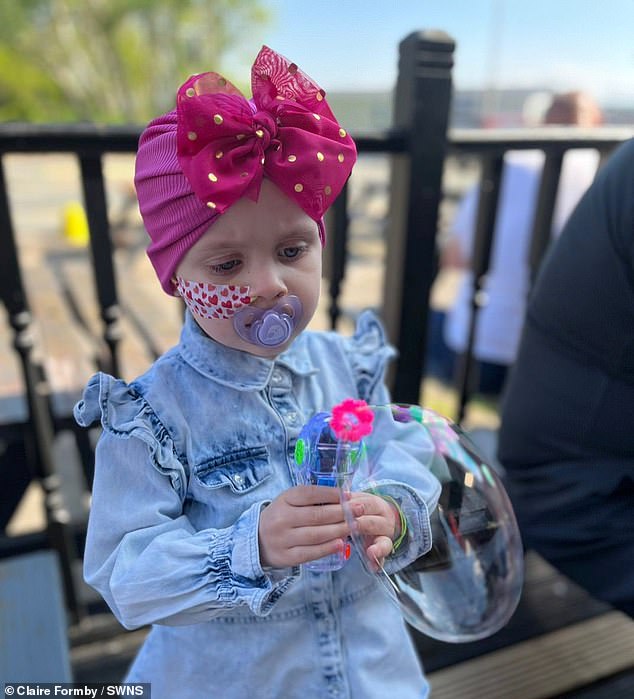
Medics at Warrington Hospital told Ella, from Runcorn in Cheshire, she could also simply have a viral infection, her mother Claire Formby claimed
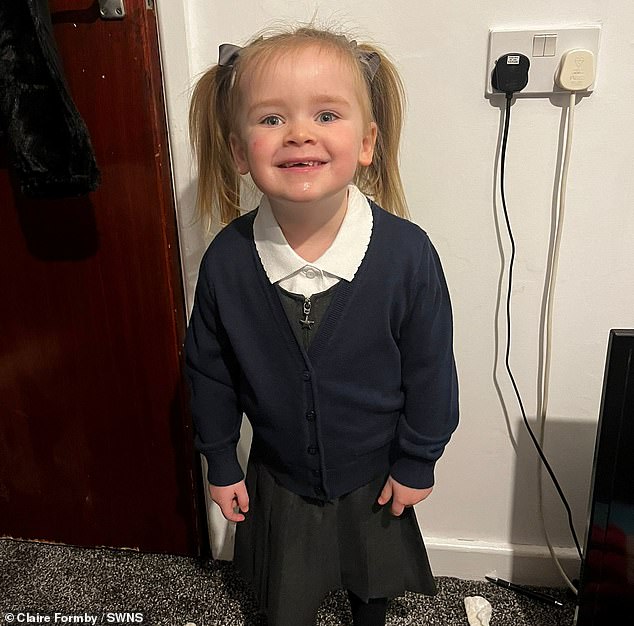
Ella now faces surgery, a stem cell transplant, radiotherapy and immunotherapy to treat the cancer, her mother Claire Formby claimed
By stage four, the cancer has spread to parts of the body that are some distance from where it started — most commonly to the bones, bone marrow or liver.
Some 100 children in the UK and 800 youngsters in the US are diagnosed with the rare cancer every year, which is most common in under-fives.
Around half of those diagnosed with stage-four neuroblastoma will live for five years after their diagnosis.
A spokesman for Warrington and Halton Teaching Hospitals NHS Foundation Trust said: ‘The Trust is very sorry to hear about Ella’s diagnosis at the regional specialist children’s hospital.
‘An investigation into the care provided to Ella during her hospital admissions at the Trust is being progressed.
‘We appreciate that this is a very difficult time for Ella’s family, and we will do all that we can to support Ella’s family during the investigation, ensuring that all findings are shared as soon as possible.’
A GoFundMe campaign has also been launched for Ms Formby and Ella, raising over £22,000 since April for Ella’s care.



